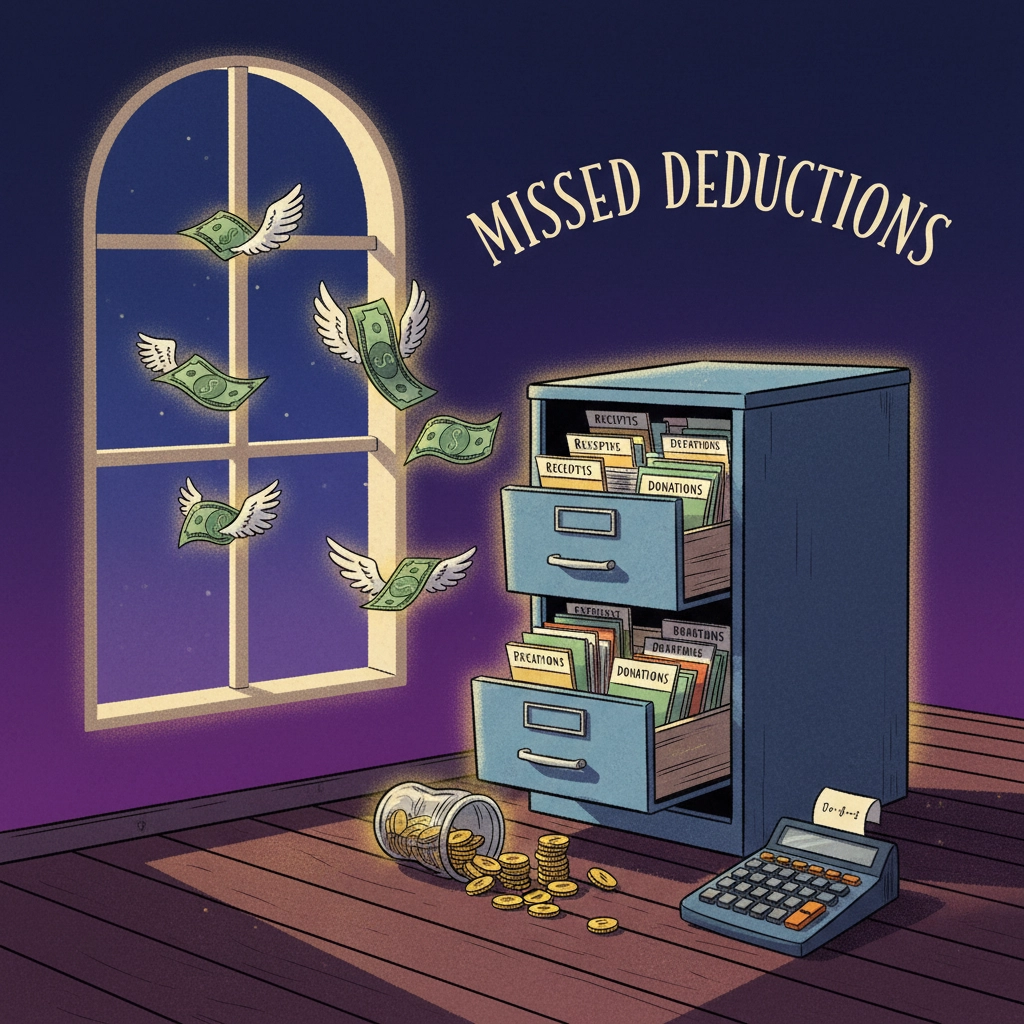Simplify your financial management – let us organize your books
Are You Making These 5 Common Property Management Bookkeeping Mistakes?

Let’s be honest, property management bookkeeping isn’t exactly anyone’s idea of a fun Friday night. But here’s the thing: those “boring” numbers can make or break your business. I’ve seen property managers lose thousands of dollars and countless hours of sleep simply because they made a few common (and totally avoidable) bookkeeping mistakes.
If you’re managing rental properties, chances are you’re wearing about fifteen different hats on any given day. You’re the maintenance coordinator, tenant whisperer, emergency responder, and somehow also supposed to be a bookkeeping wizard. No pressure, right?
The good news? Most property management bookkeeping disasters follow predictable patterns. Once you know what to watch out for, you can dodge these financial landmines like a pro. Let’s dive into the five mistakes that trip up even the most seasoned property managers, and more importantly, how to fix them.
Mistake #1: Mixing Personal and Business Expenses
This one’s the granddaddy of all bookkeeping nightmares. Picture this: you’re grabbing lunch after showing a property, and you decide to pick up some supplies for a tenant repair on the way back. You pay for everything with your personal credit card because, hey, it’s convenient.
Fast forward to tax season, and you’re sitting there with a shoebox full of receipts, trying to remember which lunch was business-related and which hardware store trip was for your own home. Sound familiar?
When you mix personal and business expenses, you’re essentially creating a financial puzzle that gets harder to solve with each passing month. Your cash flow becomes impossible to track, your financial reports look like abstract art, and you’ll have no clue whether your business is actually profitable.
The fix is surprisingly simple: Open separate bank accounts and get a dedicated business credit card. I know it sounds like more work, but trust me, your future self will thank you. Every business expense goes through business accounts, every personal expense through personal ones. No exceptions, no “just this once.”
Pro tip: Most accounting software can automatically categorize transactions when you connect your business accounts. It’s like having a bookkeeping assistant who never takes sick days.
Mistake #2: Not Tracking Expenses by Individual Property
If you manage multiple properties, this mistake can turn your profitable portfolio into a guessing game. Let’s say you own three rental units. Property A is your cash cow, Property B breaks even, and Property C is secretly bleeding money, but you won’t know this if you’re lumping all expenses together.
Without property-specific tracking, you might think you’re doing great overall while one property slowly drains your profits. It’s like judging a baseball team’s performance by their total runs scored without considering how many games they played.
Here’s how to get organized: Set up your accounting system to track income and expenses separately for each property. Most property management software makes this easy, you can assign every transaction to a specific property with just a few clicks.
Create separate folders (digital or physical) for each property’s documents. When Property A needs a new water heater, that expense gets tagged to Property A’s account. When Property C generates rental income, it goes into Property C’s income category. This way, you’ll know exactly which properties are your stars and which ones need attention.
Mistake #3: Inaccurate or Incomplete Record-Keeping
Let me paint a picture that might feel uncomfortably familiar: It’s 11 PM, you’re finally sitting down to update your books, and you’re staring at a credit card statement filled with transactions you can barely remember. Was that $47 charge for property maintenance or did you grab dinner after a late showing?
Incomplete records are like trying to navigate with a map that’s missing half the streets. You might eventually reach your destination, but you’ll waste a lot of time and gas along the way.

The most common culprits? Forgetting to log cash expenses, losing receipts, and the classic “I’ll remember what this was for” approach. Spoiler alert: you won’t remember.
The solution requires building better habits: Set aside 15 minutes every few days to update your records. Yes, every few days, not every few weeks. Take photos of receipts immediately using your phone (most apps can scan and categorize them automatically). If you pay cash for anything business-related, write yourself a quick note or send yourself a text with the details.
Consider it like brushing your teeth for your business. Do it regularly, and you’ll avoid painful problems later.
Mistake #4: Missing Out on Tax Deductions
This one hurts because you’re literally leaving money on the table. Property management comes with tons of legitimate tax deductions, but if you’re not tracking expenses properly or you don’t know what’s deductible, you’re essentially giving the IRS a bigger tip than they deserve.
Common missed deductions include office supplies, mileage for property visits, professional development courses, software subscriptions, and even a portion of your home office expenses if you work from home.
Here’s what makes this mistake extra frustrating: you’re already spending the money on legitimate business expenses. The only thing standing between you and tax savings is proper documentation and organization.
Getting every deduction you deserve: Keep detailed records of all business-related expenses throughout the year, not just when tax season rolls around. Use accounting software that automatically categorizes common property management expenses. And seriously, consider working with a tax professional who understands real estate, they often pay for themselves through the deductions they help you identify.
Think of it this way: every receipt you properly track and categorize is like finding money in your jacket pocket. Except instead of five dollars, it might be hundreds or thousands in tax savings.

Mistake #5: Delaying Bookkeeping Until Tax Time
Ah, the procrastination special. I get it: bookkeeping feels about as exciting as watching paint dry, so it’s tempting to push it off until you absolutely have to deal with it. But cramming a year’s worth of financial records into a frantic few weeks is like trying to study for finals by reading the entire textbook the night before the exam.
When you wait until tax season to tackle your books, you’re guaranteed to make mistakes. You’ll miss transactions, miscategorize expenses, and probably forget about some deductions entirely. Plus, you’ll be stressed, rushed, and more likely to overlook important details.
But here’s the real kicker: throughout the year, you’ll have no idea how your business is actually performing. Are you profitable? Which properties are your best performers? Should you raise rents? These questions are impossible to answer without current financial data.
Breaking the procrastination cycle: Treat bookkeeping like a regular business appointment that you can’t reschedule. Block out time each week: even just 30 minutes: to update your records. Use automation wherever possible: automatic bank feeds, recurring transactions, and expense categorization rules can handle most of the heavy lifting.
Set up monthly financial check-ins with yourself. Review your profit and loss statement, check your cash flow, and celebrate the good months (or figure out what went wrong during the tough ones).
The Bottom Line: Small Changes, Big Results
Here’s the thing about these mistakes: they’re all completely fixable with the right systems and habits. You don’t need an accounting degree or expensive software to keep accurate books. You just need to be consistent and intentional about it.
The property managers who consistently avoid these mistakes aren’t necessarily smarter or more organized than everyone else. They’ve just learned that spending a little time on bookkeeping regularly saves them massive headaches (and money) down the road.
Think of good bookkeeping habits as an investment in your peace of mind. When tax season rolls around, you’ll be the person calmly gathering organized documents while everyone else is frantically searching through boxes of receipts.
Ready to get your property management bookkeeping on track? Start with fixing whichever mistake hit closest to home, then tackle the others one by one. Your future self: and your accountant: will definitely thank you.
If you’re feeling overwhelmed by the thought of organizing your financial records, remember that Nova Ledgers specializes in helping property managers get their books in order. Sometimes the best investment you can make is getting professional help to set up systems that work for your specific situation.
